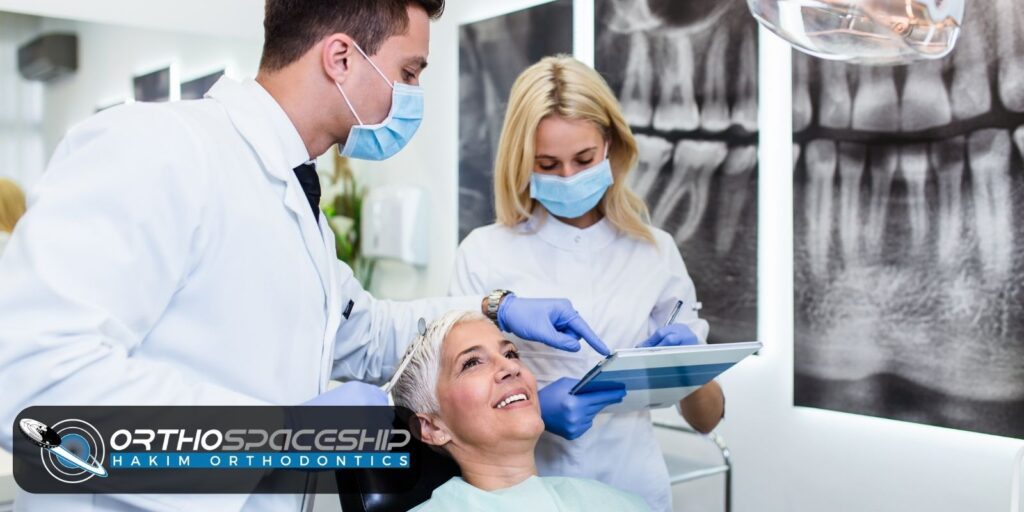If you are considering orthodontic treatment to improve your oral health, you may be wondering what the difference is between an orthodontist and a dentist. While both dentists and orthodontists are dental professionals, there are some key differences between the two that you should be aware of.
Difference in training and expertise
One of the primary differences between dentists and orthodontists is the focus of their training and expertise. All dentists receive the same education and training in dental school, which includes a thorough understanding of tooth decay, gum disease, and other oral health issues. This enables them to provide a wide range of general dental services, such as cleanings, fillings, and extractions.
However, not all dentists choose to specialize in orthodontic treatment. Orthodontists, on the other hand, undergo additional training and education in order to become experts in the diagnosis and treatment of crooked teeth and poorly aligned jaws. This typically includes completing an orthodontic residency program after dental school, and passing a rigorous certification examination.

Specialists vs. General Dentistry
Because of their additional training and expertise, orthodontists are better equipped to provide specialized orthodontic treatments, such as braces and Invisalign. These treatments can be complex and require a deep understanding of teeth alignment and jaw structure. Orthodontists are also more likely to be able to identify underlying issues that may be contributing to crooked teeth or misaligned jaws, and can recommend the most appropriate treatment options.

Different Approaches to Treatment
Another key difference between dentists and orthodontists is their approach to treatment. Dentists are generally focused on treating specific oral health issues, such as tooth decay or gum disease. They may refer patients to an orthodontist for specialized orthodontic care if necessary. Orthodontists, on the other hand, are focused on improving the overall alignment of a patient’s teeth and jaws. This can help to prevent long-term oral health problems, such as difficulty chewing or speaking.
While not all dentists specialize in orthodontic treatment, some general dentists do provide basic orthodontic care, such as fitting patients for braces or retainers. However, these dentists are not as well-trained or experienced in orthodontics as orthodontists are. If you have a complex orthodontic issue, or if you are concerned about the alignment of your teeth and jaws, it is best to see an orthodontist for an initial consultation.

Treatment Options
In addition to their specialized training and expertise, orthodontists also have access to a wider range of orthodontic treatment options. This includes advanced technologies, such as digital imaging and computer-aided design, which can help to create more precise and effective treatment plans. Orthodontists can also offer a wider range of braces and other orthodontic appliances, including clear braces and invisible aligners.

Unique Advantages of Seeing An Orthodontist
Another advantage of seeing an orthodontist for your orthodontic treatment is the level of care and attention you will receive. Orthodontists are highly trained and experienced in providing specialized orthodontic care, and they are dedicated to helping their patients achieve optimal oral health. This means that they will take the time to carefully evaluate your teeth and jaws, and will work with you to create a personalized treatment plan that is tailored to your unique needs and goals.
Orthodontists are also committed to providing long-term care and support for their patients. This includes regular checkups and adjustments to ensure that your teeth and jaws are moving into the correct alignment. It also means being available to answer any questions or concerns you may have throughout the course of your treatment.

Other Frequently Asked Questions About Orthodontists vs. Dentists
Is an orthodontist better than a dentist?
It depends on your specific needs and goals. While both dentists and orthodontists are dental professionals, orthodontists have additional training and expertise in the diagnosis and treatment of crooked teeth and misaligned jaws. If you have a complex orthodontic issue, or if you are concerned about the alignment of your teeth and jaws, an orthodontist may be the better choice. However, if you only require general dental care, such as cleanings and fillings, a dentist may be sufficient. It is best to discuss your specific needs and goals with both a dentist and an orthodontist to determine the best course of treatment.
Do orthodontists clean teeth?
Orthodontists do not typically clean teeth. While they are trained in the diagnosis and treatment of orthodontic issues, such as crooked teeth and misaligned jaws, they do not typically provide general dental care services, such as cleanings and fillings. These services are typically provided by a general dentist or a dental hygienist. If you need your teeth cleaned, you should visit a dentist or dental hygienist, rather than an orthodontist. However, an orthodontist may perform a cleaning as part of your orthodontic treatment if necessary.
Can a general dentist do braces?
Some general dentists do provide basic orthodontic care, such as fitting patients for braces or retainers. However, these dentists are not as well-trained or experienced in orthodontics as orthodontists are. If you have a complex orthodontic issue, or if you are concerned about the alignment of your teeth and jaws, it is best to see an orthodontist for an initial consultation. An orthodontist has additional training and expertise in the diagnosis and treatment of crooked teeth and misaligned jaws, and can provide you with the specialized care you need.
Is it harder to become a dentist or orthodontist?
Becoming a dentist or an orthodontist requires a significant amount of education and training. Both dentists and orthodontists must complete four years of dental school, where they receive training in the diagnosis and treatment of a wide range of oral health issues. However, orthodontists must also complete an additional two to three years of specialized training in orthodontics, as well as pass a rigorous certification examination. This additional training and expertise makes orthodontists highly qualified to diagnose and treat complex orthodontic issues. Because of this, it may be considered more challenging to become an orthodontist than a dentist.
Final Thoughts
Overall, the main difference between an orthodontist and a dentist is the additional training and expertise that orthodontists have in the diagnosis and treatment of crooked teeth and misaligned jaws. While all dentists receive the same education and training in dental school, orthodontists undergo additional education and training in order to specialize in orthodontic care. If you are considering orthodontic treatment, it is best to see an orthodontist for an initial consultation. An orthodontist can provide you with the specialized care and attention you need to achieve optimal oral health and a beautiful smile.
